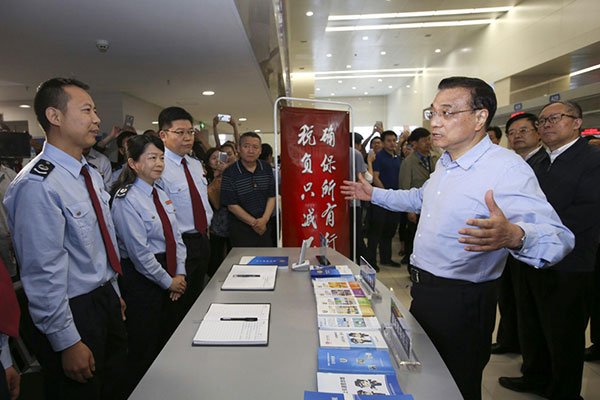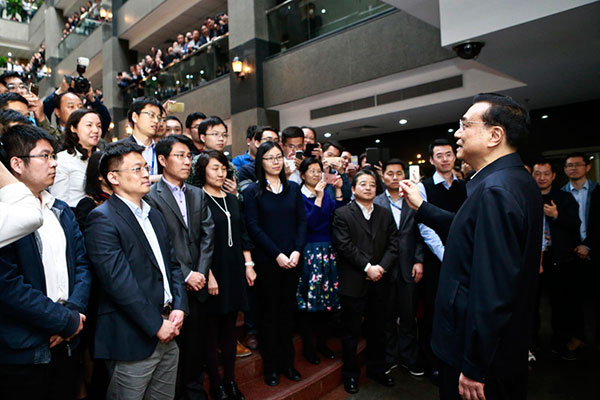
Premier Li Keqiang visits the civic service center of Shiyan, Hubei province and inquires about the implementation of value-added tax (VAT) reform on May 23, 2016. [Photo/Xinhua]
Economic data of the third quarter released by the Ministry of Finance revealed that the Chinese government has carried out proactive fiscal policies such as tax cut to maintain a stable economic growth.
The proportion of tax revenue in the general budget in September registered a year-on-year drop of 0.7 percent, declining for the first time since February 2015.
“Instead of only focusing on increasing deficit or expanding the scale of government projects, we should also relieve enterprises’ burden by cutting taxes and fees, which is also a positive fiscal policy,” Premier Li stressed at a State Council executive meeting in 2015.
These taxes and fees, including invisible taxes and social insurance spending, have burdened Chinese enterprises tremendously, which have turned tax evasion and fraud into common practices, driving away the businessmen who abide by the law. And the State-owned enterprises (SOEs) which usually enjoy favorable tax policies or local protection have become evermore aggressively competitive than the private enterprises.
The tax-cut policy is intended for pursuing long-term benefit. Judging from the stable performance shown by the economic data in the third quarter, the policy has benefited enterprises in the long run through establishing an innovative and reasonable tax collection structure.
Despite a gradual and slow effect on GDP and fiscal revenue growth, tax-cut has avoided the negative side of implementing a simple deficit-increasing policy, which resulted in irrational government spending at the end of each year. Amid the sluggish growth of global economy, the effectiveness of such short-term policy has largely diminished.
Thanks to the nationwide pilot program to replace the business tax with the value added tax (VAT) carried out from May 1 this year, tax-cut revenue accumulated to 249.3 billion yuan in the first eight months. It is projected that over 500 billion yuan tax burden will be further relieved for both enterprises and individuals within the year.
In addition, the government’s future fiscal policy will focus on boosting economic growth while being less dependent on expanding the scale of government investment, with measures such as promoting bank loans on consumption, and increasing fiscal spending to stimulate consumption, especially fiscal expenditure on low-income groups.

Premier Li inspects the State Administration of Taxation (SAT) on the progress regarding the replacement of the business tax with VAT on April 1, 2016. [Photo/China Daily]
